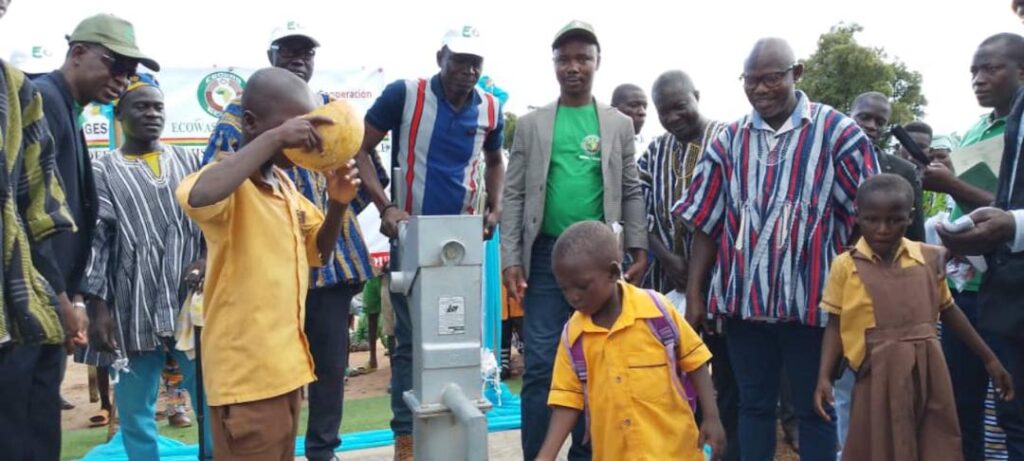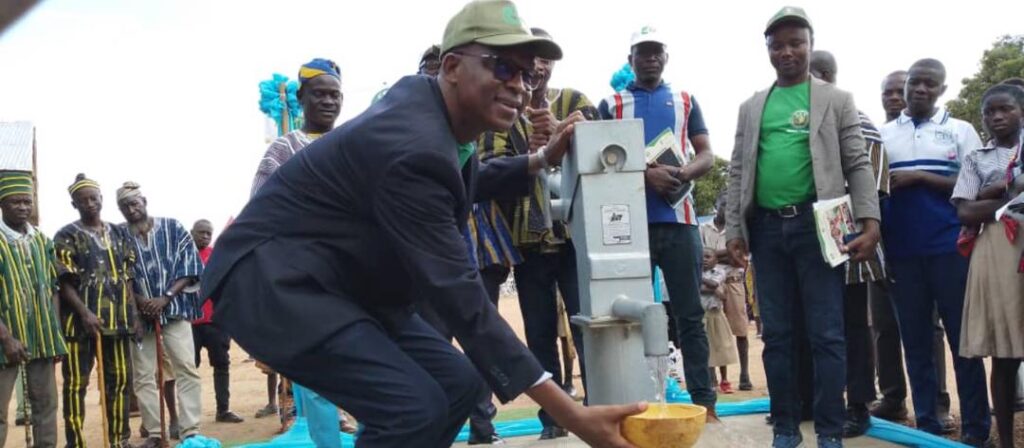ECOWAS and MCSG Commission Life-Changing Water Borehole at Dakuma/Hiel Basic School.
By Raymond Enoch
ECOWAS, in collaboration with the Millennium Child Support Group (MCSG), has commissioned and handed over a newly constructed water borehole to Dakuma/Hiel Basic School in the Sissala West District of Ghana’s Upper West Region. The project, completed with technical and financial backing from the Spanish Cooperation, is part of a broader regional initiative to support school feeding programs and promote academic success among underprivileged schoolchildren.

The water facility, officially inaugurated on Wednesday, stands as a critical investment in education, public health, and rural development. It is aimed at addressing persistent challenges in rural schools, particularly the impact of water scarcity on student attendance, hygiene, and learning outcomes. According to organizers, the borehole will significantly reduce water-related absenteeism, enhance sanitation and hygiene for pupils, and alleviate the burden of water collection, which disproportionately affects girls.

The project is being implemented under the “Promoting Academic Success among Underprivileged Schoolchildren at Rural Areas through School Feeding Program in Ghana” initiative led by MCSG. The program takes a holistic approach to school feeding by integrating water resource management, agricultural hydraulics, the development of agroecological vegetable gardens, and livestock production to enrich school meals with fresh produce and animal proteins. These interventions are supported by hygiene kits, nutritional education, community-based governance structures, and local supply chain development for school canteens.
Speaking at the handover ceremony on behalf of Mr. Mohamed Zongo, Executive Director of the ECOWAS Regional Agency for Agriculture and Food (RAAF), ECOWAS representative Mr. Francis Dabiré commended MCSG for its leadership and grassroots engagement. He described the project as a model of inclusive, community-driven development, tailored to local needs and realities.
Dr. Godfrey Ato Parker, Chief Executive Officer of MCSG and Project Coordinator, addressed the gathered community members, school officials, and ECOWAS delegates, reiterating the organization’s commitment to ending classroom hunger and improving children’s educational outcomes across rural Ghana. He called for sustained partnerships and deeper collaboration to extend the program’s reach to other vulnerable schools in the region.
The event was attended by the District Chief Executive, Mr. Fuseini Gbene, the District Director of Education, representatives of the Ghana Health Service, traditional leaders from Zini and Dakuma, teachers, parents, and students. Community members expressed enthusiasm and pledged to maintain the facility and contribute to the long-term sustainability of the initiative after the project’s conclusion.
Mr. Gbene thanked ECOWAS for its vital support through the grant to MCSG and emphasized that the project complements Ghana’s national school feeding policy. He noted that while more support is still required to meet the sector’s needs, the country remains committed to inclusive, cross-sector efforts and will continue to seek partnerships that drive development in education and child welfare.
This latest intervention follows the commissioning of a similar borehole at Kanee Basic School in the Jirepa Municipality earlier this year and forms part of ECOWAS’s broader Regional School Feeding Program. The initiative spans all ECOWAS Member States as well as Burkina Faso, Mali, and Niger, investing in both human capital development and local economic growth through agriculture-based solutions. Through programs like these, ECOWAS aims to foster not only better educational outcomes but also more resilient and self-sustaining rural communities.









